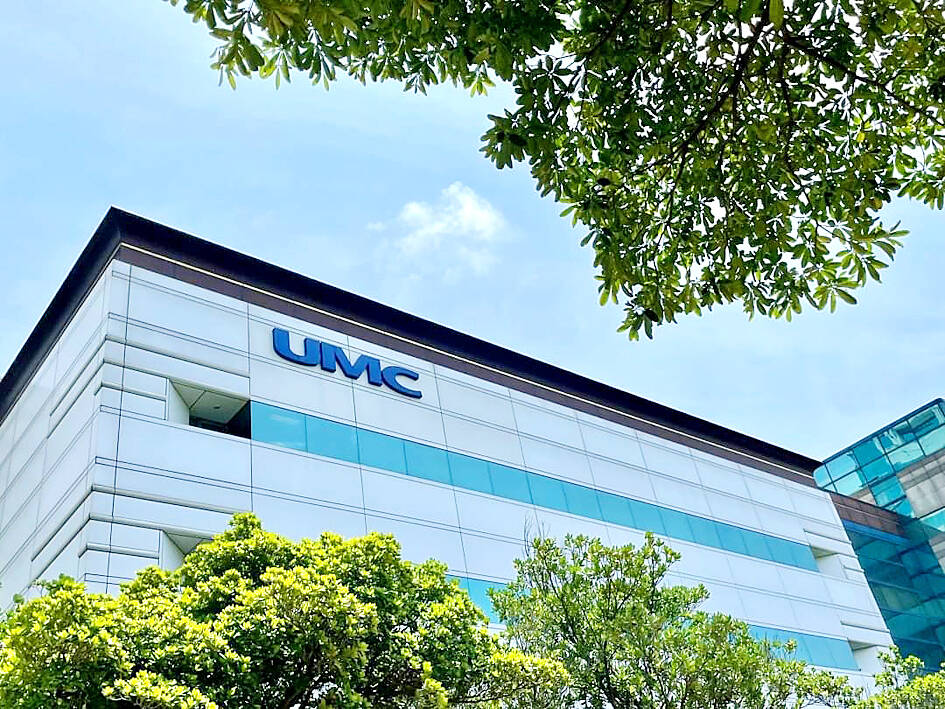United Microelectronics Corp (UMC, 聯電), a foundry service supplier, yesterday said it still aimed to outpace its addressable market’s 3-percent revenue growth this year after reporting the worst quarterly net profits in about 4-and-half years for last quarter.
The growth would be fueled by strong demand for artificial-intelligence (AI) servers and a moderate recovery in consumer electronics and increase in semiconductor content, UMC said.
UMC's addressable market is to lag the overall foundry industry’s growth of 15 percent expansion and 10 percent growth for the world semiconductor industry this year.

Photo: Grace Hung, Taipei Times
“UMC’s goal is to outgrow our addressable market while maintaining our structural profitability,” UMC copresident Jason Wang (王石) told an online earnings conference.
For the current quarter, UMC expects wafer shipments to be flat from last quarter.
“The first quarter is better than traditional seasonality,” Wang said. “It could be triggered by either the [US] tariffs or the subsidies [on consumption by Beijing]. We are hoping that the second quarter can sustain that [momentum], but at this point, due to limited visibility, we cannot give you a second-quarter guidance.”
Gross margin is expected to drop to below 30 percent but above 25 percent this quarter, compared with 30.4 percent last quarter, attributable to a 5 percent decline in average selling prices and higher depreciation expenses, UMC said.
That also factored in the impact of a magnitude 6.4 earthquake that hit Chiayi County yesterday.
The factory utilization rate is to be little changed versus last quarter at 70 percent, it said.
To fend off growing competition, UMC is looking to strengthen its product portfolio and boost revenue contribution from 22-nanometer and 28-nanometer chips, the most advanced chips available from UMC, to 37 or 38 percent this year, from 34 percent last year, Wang said.
UMC is also committed to collaborating with Intel Corp in developing 12-nanometer technology, Wang said.
In addition, UMC is broadening its advanced chip packaging product offerings beyond the 2.5-D interposer that is used in chip-on-wafer-on-substrate technology, Wang said.
The chipmaker would not miss out on business opportunities associated with new photonic ICs, he said.
UMC plans to allocate 38 percent less capital expenditure this year at US$1.8 billion, compared with US$2.9 billion last year.
Net profit plummeted 35.6 percent year-on-year to NT$8.5 billion (US$259.4 million) last quarter. That represented a quarterly contraction of 41.4 percent from NT$14.47 billion in the third quarter last year.
Last year as a whole, UMC’s net profit shrank 22.6 percent to NT$47.21 billion compared with NT$60.99 billion in 2023. Earnings per share fell to NT$3.8 from NT$4.93.

NEW IDENTITY: Known for its software, India has expanded into hardware, with its semiconductor industry growing from US$38bn in 2023 to US$45bn to US$50bn India on Saturday inaugurated its first semiconductor assembly and test facility, a milestone in the government’s push to reduce dependence on foreign chipmakers and stake a claim in a sector dominated by China. Indian Prime Minister Narendra Modi opened US firm Micron Technology Inc’s semiconductor assembly, test and packaging unit in his home state of Gujarat, hailing the “dawn of a new era” for India’s technology ambitions. “When young Indians look back in the future, they will see this decade as the turning point in our tech future,” Modi told the event, which was broadcast on his YouTube channel. The plant would convert

‘SEISMIC SHIFT’: The researcher forecast there would be about 1.1 billion mobile shipments this year, down from 1.26 billion the prior year and erasing years of gains The global smartphone market is expected to contract 12.9 percent this year due to the unprecedented memorychip shortage, marking “a crisis like no other,” researcher International Data Corp (IDC) said. The new forecast, a dramatic revision down from earlier estimates, gives the latest accounting of the ongoing memory crunch that is affecting every corner of the electronics industry. The demand for advanced memory to power artificial intelligence (AI) tasks has drained global supply until well into next year and jeopardizes the business model of many smartphone makers. IDC forecast about 1.1 billion mobile shipments this year, down from 1.26 billion the prior

People stand in a Pokemon store in Tokyo on Thursday. One of the world highest-grossing franchises is celebrated its 30th anniversary yesterday.

Zimbabwe’s ban on raw lithium exports is forcing Chinese miners to rethink their strategy, speeding up plans to process the metal locally instead of shipping it to China’s vast rechargeable battery industry. The country is Africa’s largest lithium producer and has one of the world’s largest reserves, according to the US Geological Survey (USGS). Zimbabwe already banned the export of lithium ore in 2022 and last year announced it would halt exports of lithium concentrates from January next year. However, on Wednesday it imposed the ban with immediate effect, leaving unclear what the lithium mining sector would do in the